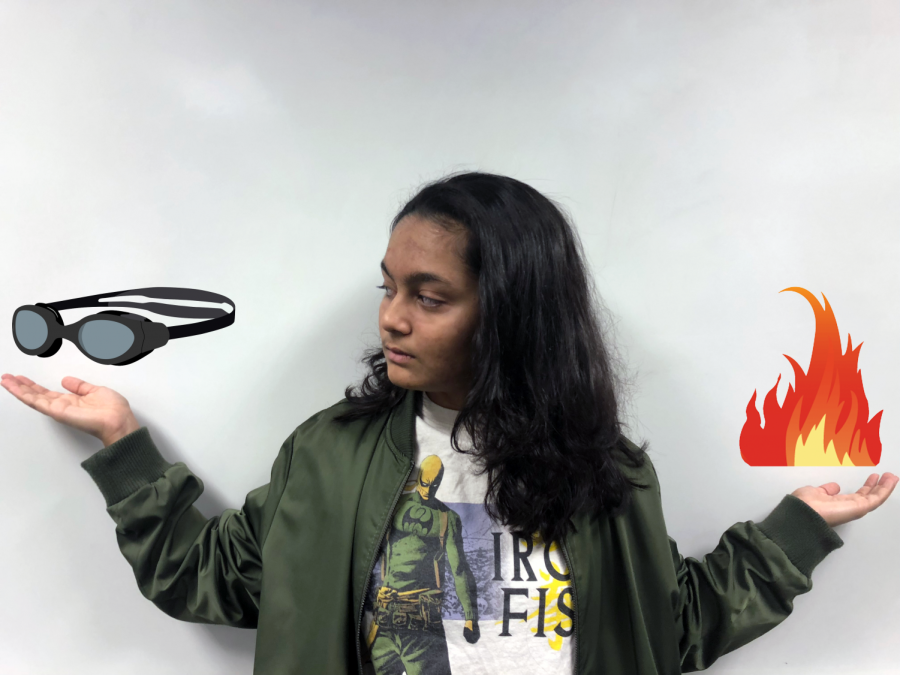Dedicated or desensitized?: Athletes continue to train hard as smoke envelops California
November 30, 2018
“Practice is cancelled again today! How will I race next weekend?” My sister bursts through the door, her voice laced with concern. We launch into a discussion, trying to decide the best workaround. Three hours later, we’re swimming indoors at our local YMCA, relieved to be able to continue practicing. Similar scenes played out across California as the Air Quality Index (AQI) crept higher and higher and athletes scrambled to find indoor training options.
While many in California were hit hard by the smoky skies, athletes faced a unique struggle. Swimmers, for instance, put in months and months of training to build up to championship performances. Even a few days without practice could keep us from reaching our goals, especially when the difference between success and failure comes down to milliseconds.
We didn’t have an uninterrupted practice between Nov. 8 and Nov. 21, and the meets that we had spent weeks preparing for were cancelled. Most local clubs cancelled practice or meets on the days that the AQI went above 150, and many parents have opted to keep their children home as well. These precautions are absolutely reasonable, of course. Athletes, especially swimmers, are already short of breath after physical exertion. This, combined with a lack of oxygen, could have dangerous effects. Athletes are extremely in-tune with their bodies, and they respect and care for their bodies meticulously. This begs the question: is it better to play it safe, or put in the extra work to beat the competition?
For someone like my little sister, who is asthmatic, the decision is crystal clear. She can’t afford to risk the possible repercussions of inhaling too much smoke. Because of her, my family knows first-hand the struggles of having breathing difficulties. So, we turned to indoor options when the smoke appeared, choosing to keep ourselves safe while still trying to put together some semblance of a workout. Unsurprisingly, when we turned up at the YMCA pool, we were surrounded by familiar faces: teammates who were looking to stay in shape as well. They narrated stories of practices being cut short and exhausted swimmers running out of the pool in search of “fresh air.” We concluded that it was impossible to keep up regular practice routines in these difficult conditions. We dove into our workouts with the goal of being ready for our upcoming meets.
Are we being insensitive to the victims of the fire by looking for ways to work around these inconveniences and keep up our strength? I would beg to differ. We can hardly be expected to sit around in fear of the smoke for days on end. We spend hours training daily; two weeks can undo a lot. When it was just one day, we treated it as a short break. Practices were reduced due to poor air quality for almost two weeks; it reached a point where it would seriously impact our upcoming races if we didn’t take action. We are still expected to be on top of our game now that the skies have cleared, which is not easy to do if we spent 10 days out of the water. In fact, there’s a popular saying around the pool deck: “For every day out of the water, it takes two to get back.” As the fall swim season draws to a close and the last meet of the year approaches, we’re running out of time.
Of course, the workouts we create ourselves are hardly comparable to practicing with our coaches. Still, it is better than nothing. As we slip into the pool, the girl next to me is lost in thought. “Next time,” she says, “I’ll ask coach to send us the sets.”
To me, the words are hard-hitting. Our inexperience with the smoke gives away the fact that we have never had to deal with this before. As far as we can remember, California has never had a fire that made outdoor activity virtually impossible for half the state; California was sorely unprepared for these wildfires. But if disasters like these become more common, our workarounds will only become more efficient. “Next time,” we’ll ask coach to send us sets. “Next time,” we won’t miss a single day of practice in the confusion. Slowly but surely, battling the smoke may become as commonplace to us as choking on water while swimming butterfly. If left unchecked, these sensational fires might become recurring news. It’s a rather grim view of the future, but athletes aren’t the type to give up, no matter the stakes.



































































